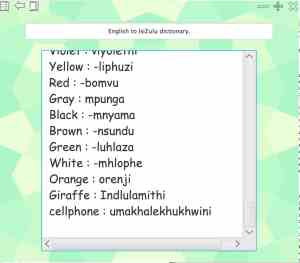While I’ll be at EKAW’14 to network, present the stuff ontology, and support SUGOI, some of my students will hold the fort locally at the African Language Technologies Workshop (AFLaT’14) on 27-28 November in Cape Town. One of the two posters & demos I contributed to is about a cute tool that two 3rd-year students—Ntokozo Zwane and Sungunani Silubonde—designed and implemented as their capstone project for software engineering, which they called VocabLift (zip). The capstone groups’ task was to develop a tool that can help someone to learn vocabulary in a playful way, which had some leeway to be creative in how to realize that.
The context is that everyone has to learn vocabulary over the years, from basic words in primary school to scientific terminology at university, and any time when one is learning a new language. Besides memorizing ‘boring’ lists of words from a sheet of paper, there are more playful ways to do this, like the multi-player dictionary game and hangman, or single-player memory cards game from the EuroTalk DVDs. There are indeed many word games online, e.g., for English, and learning a foreign language on duolingo, but there is less for multilingualism and the languages in Southern Africa. EuroTalk DVDs for Zulu, Shona, Swahili, Yoruba and a few other African languages do exist, true, but at a cost and they are inflexible in a teaching setting. Enter VocabLift, which is both technologically interesting and for the target languages chosen: isiZulu and Shona, and English and French. Conceptually, it is based on natural language-independent root questions that are mapped to the language of choice, so another language easily can be added, and, unlike the usual ‘closed’ world of the computer-based language games, a teacher can add words to the dictionary, making it in principle adaptable to the desired level of language learning.
Currently, VocabLift has three games: the Picture Matcher, Vocab Trainer, and Word Tetris. In Picture Matcher, the name of the object in the picture has to be provided by the user, with as objective to improve memory and spelling in the chosen language; a screenshots for avocado in isiZulu and pineapple Shona are shown below.
Vocab Trainer tests the user’s ability to recall the word given in English in the target language; screenshots for green in isiZulu and gray in French are shown below.

Choosing the right word for ‘green’ in isiZulu (the answer also can be found further below in another screenshot)
The third game, Word Tetris is included so that the user can learn to match the word to the picture. The user has to type the word associated with the picture before it falls below the bar; a screenshot is shown below (I lost points due to trying make nice screenshots, really).
One needs to be logged in as administrator to add words (admin 1234 will do the trick) and use the tool in ‘dictionary mode’, as illustrated in the next two screenshots.
VocabLift has been implemented using JavaFX and XML, making the tool platform-independent (click the VocabLift.jar file once the downloaded zip file is unzipped). I’ll readily admit it is very well possible to add more features, adapt it to have it running also on a mobile, or refine the HCI, and some educational technologies researcher may want to investigate whether this or something like it improves the learning outcome significantly, but it was a fun software engineering project over a timespan of a mere two months (with other parts of the course being taught) and words surely can be learnt (at least I have, and so did the students).
The AFLaT’14 poster and demo session runs from 15:30-16:30 on the 27th and will remain available during the breaks on the 28th as well, and Ntokozo and Sungunani will be happy to demo it for you and describe more details about it.






Pingback: Progress on generating educational questions from ontologies | Keet blog